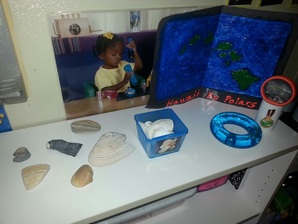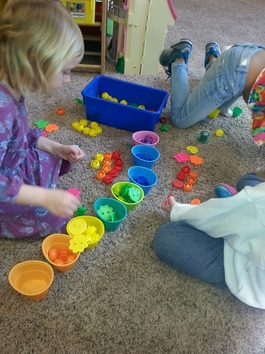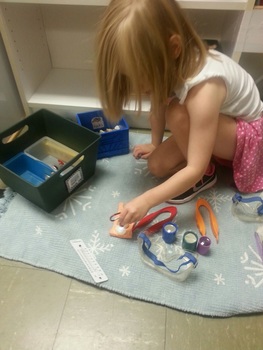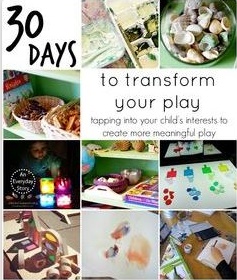Child Lead Play and Exploration
 Hawaii & Seashell Provocation. Photo courtesy of Kristi Lease
Hawaii & Seashell Provocation. Photo courtesy of Kristi Lease
The Reggio Emilia Approach is lead by the child's curiosity, connection to the world around them, and the belief that children have the ability to develop their own potential. “Influenced by this belief, the child is beheld as beautiful, powerful, competent, creative, curious, and full of potential and ambitious desires." Hewitt, Valarie (2001). "Examining the Reggio Emilia Approach to Early Childhood Education". Early Childhood Education Journal 29 (2): 95-10.
Play is driven by the children's interests, questions, and the world that they live in. The materials available for play add to the children's play in meaningful ways. The opportunity for children to create their own play and explorations helps to develop independence and creative thinking. As child guide their own play, social interactions take place and relationships are built. Language is developed, math and science is explored, creativity and art go hand in hand, nature finds its way into many play scenarios and explorations, and the culture of others in discovered in meaningful ways. Children are truly engaged in their play.
Provocations are often set-up by teachers, after observation of the children, to encourage discussion, exploration, experimentation, interest, and thinking. Provocations may be based on a topic of interest that the children are studying. Once children initiate a study or project, teachers can add to the play and exploration on the topic by planning and preparing meaning set-ups in different areas of the classroom.
Provocations could be:
Play is driven by the children's interests, questions, and the world that they live in. The materials available for play add to the children's play in meaningful ways. The opportunity for children to create their own play and explorations helps to develop independence and creative thinking. As child guide their own play, social interactions take place and relationships are built. Language is developed, math and science is explored, creativity and art go hand in hand, nature finds its way into many play scenarios and explorations, and the culture of others in discovered in meaningful ways. Children are truly engaged in their play.
Provocations are often set-up by teachers, after observation of the children, to encourage discussion, exploration, experimentation, interest, and thinking. Provocations may be based on a topic of interest that the children are studying. Once children initiate a study or project, teachers can add to the play and exploration on the topic by planning and preparing meaning set-ups in different areas of the classroom.
Provocations could be:
- A concept i.e. change
- A problem i.e. children touching chrysalises and damaging them
- An object i.e. a map
- Nature e.g. children's fascination with sticks
- A question from the teacher
- Questions from the children
- Song lyrics
- An event
- A book
- An interest that a child or group of children have
- A requirement i.e. the school show
"The pleasure of learning, of knowing, and of understanding is one of the most important and basic feelings that every child expects from the experiences he confronts alone, with other children, or with adults. It is a crucial feeling which must be reinforced so that the pleasure survives even when reality may prove that learning, knowing, and understanding involve difficulty and effort. It is in this very capacity for survival that pleasure is transformed into pure joy."
–Loris Malaguzzi
|
Find more Provocations at my Pinterest account: https://www.pinterest.com/krissi8782/reggio-emilia-provocations/
|



